| LATE LEARNING
Thanks to Walter Presents, I am learning Italian one crime series at a time and my current homework revolves around the first series of Il Commissario Ricciardi, a far from conventional police procedural set in Naples in 1931.

The impossibly handsome Inspector Ricciardi is a troubled introvert, a member of the landed gentry who has, it seems, abandoned the aristocracy for life as an honest policeman at a time when law and justice is dispensed mostly by Mussolini’s blackshirts. He has, as all fictional policemen must, a quirk and his is the (unwanted) ability to see the ghost of those who have just died by violence. This supernatural element is never explained, simply there as part of our hero’s psychological make up, but it is not overdone and is well balanced by an excellent supporting cast. (As in all Italian police dramas, there is always one minor character who is clearly the village idiot and, for comic effect, is the resident copper at the Questura who cannot open or close a door properly.)
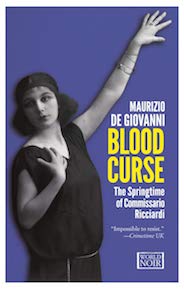
The series is based on the excellent novels of Maurizio Di Giovanni who, if his beloved Napoli wins the Champions’ League, will be unbearable. Thankfully, the television adaptations stick to regular Italian, tactfully bypassing Neapolitan accents and dialect.
As an added bonus whilst trawling Walter Presents, I discovered the recent German mini-series Faking Hitler, a fictionalised account of the famous ‘Hitler Diaries’ scandal of 1983 which was superbly covered in all its farcical detail by Robert Harris (yes, that Robert Harris) in his book Selling Hitler in 1986.
 
Harris’ book was also adapted for television in this country, though to be honest I remember very little about it other than the fact that Alexei Sayle played the jolly German forger behind the scam. The new German version, perhaps mercifully, introduces several fictional sub-plots rather than concentrating on how a well-known English-language newspaper group forked out large amounts of cash for the ‘diaries’ and had them authenticated by a very distinguished Oxford historian. Still, it is an entertaining watch and proof of the old adage that the bigger the lie, the more it will be believed.
ALL MY YESTERDAYS
Looking back thirty years to my Crime Guide column in that once great newspaper the Daily Telegraph in March 1993, I am reminded of some favourite crime novels which impressed me at the time.
I thoroughly enjoyed Hard Aground, a hardboiled Florida-set treasure-hunt thriller by James Hall; the always reliably hardboiled Mark Timlin’s Falls The Shadow; the soft-boiled, but engaging McNally’s Luck by Lawrence Sanders and a lovely sideswipe at domestic American politics by Robert Campbell in his In A Pig’s Eye. I found Lesley Grant-Adamson’s The Dangerous Edge to be ‘an elegant Euro-thriller’ and praised the ‘cunningly-plotted’ Crackpot by Philip Loraine, the pen-name of the much under-rated Robin Estridge (1920-2002).
I also enthused about ‘an impressive debut’ set on the Birmingham canals in the 1930s, Night’s Black Agents by David Armstrong. I was not aware then that David Armstrong’s book was to be publicly short-listed for the Crime Writers’ Association’s John Creasey Award, though it certainly deserved to be. The CWA, however, after naming six books and debut authors, decided that none were ‘good enough’ and no award would be made that year, which was disgraceful.
YESTERDAY’S SPY
Good news for the admirers – and there are many – of the exploits of David Callan, the world-weary British spy-cum-assassin created the late 1960s by James Mitchell and developed from a single television play into the immensely popular series Callan, five novels, two films and more than two dozen short stories.
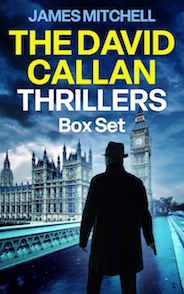
Now those five Callan novels are available in a new ‘box set’ of ebooks from Joffe Books, with paperback editions following later this year. The novels come with a few words of introduction from me (I edited the Top Notch Thriller editions some years ago) and a poignant essay from James Mitchell’s son Peter on the writing of the last, rare and rather unusual, novel in the series, Bonfire Night.
LEGAL NOTICES
For legal reasons, I never saw Stella Rimington’s The Devil’s Bargain when it was first published last year, though I had been particularly looking forward to it, delighted that Dame Stella had reneged on her threat to retire from writing fiction when I interviewed her a few years ago at a crime-writing festival in Suffolk.
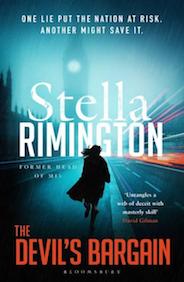
Publisher Bloomsbury has, however, finally sent me a copy to mark the book’s appearance in paperback in May. Fans of Rimington’s regular heroine, counter-spy Liz Carlyle, may be wary that she does not appear in The Devil’s Bargain, but they should fear not as Manon Tyler, a CIA analyst seconded to London, is well worth the price of admission as she picks up the scent of an ‘illegal’ – a KGB sleeper agent who has developed a deep cover as an MP.
Similarly, I was unable to cover David Hewson’s The Medici Murders when it came out last year although I had been greatly looking forward to doing so. However, I have been sent a proof of the Canongate paperback edition, which is due in May, so watch the Books of the Month section next month.
For on-going legal reasons (three years running now), I have been kept totally in the dark about the latest Roman mystery by Lindsey Davis, whose delightful books I have reviewed, given the chance, for more than thirty years. Despite being cancelled by her publisher (Hodder), Lindsey remains a faithful chumette of mine and has corrected the situation by sending me a personalised copy. [See Books of the Month].
TRAVELLING HOPEFULLY
For legal reasons I rarely attend publishing parties in the metropolis these days, but when I have to travel up from the country I now have a new procedure to help me stay sane on increasingly fraught rail journeys. I have established what used to be called a ‘bran tub’ near the front door, filled with several dozen vintage paperbacks which I have acquired over the years but never got around to reading. On leaving Ripster Hall, I select a book totally at random, the only criteria being that it fits into the jacket pocket of a well-cut suit. In other words, it is a proper paperback.
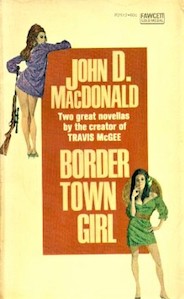
On my most recent journey, thanks to a delayed freight train ahead and the fact that it is a novella, I was able to enjoy the entirety of Border Town Girl in a 1956 Gold Medal paperback by the legendary John D. MacDonald. First published in Dime Detective Magazine under the title Five Star Fugitive in 1950. It is a fast-moving tale of a former war correspondent and bestselling author drinking his way around Mexico trying to write that difficult second novel.
The border town good-time girl he falls for as he drifts back to the USA will provide him with inspiration for that book, but only after another female has involved him in an attempted double-cross of a gang of drug smugglers who employ a particularly grotesque hit-man. As with his longer fiction (and if you’ve never read MacDonald’s ‘Travis McGee’ series, you really must), this is a masterclass in tough, tight, crime writing and I believe that this particular novella was reissued by Hassell Street Press – a new name to me – in 2021.
KINDRED SPIRIT
That rare excursion to the capital did result in one memorable meeting, with G.M. (the artist previously known as William) Shaw, the author of some fine crime novels and the thriller Dead Rich which was one of my books of the year in 2022.
Very quickly the topic of conversation turned (as it often does) to our favourite storytellers and without any prompting from me, William rattled off a list which included Alistair MacLean, Hammond Innes and Nevil Shute, which showed him to be man of depth and taste. I cannot predict the future but I have a strong feeling that The Conspirators by G.M. Shaw, to be published by Riverrun in July, could well be ne of my picks of 2023.
DISTRACTIONS
I have been distracted this month – tempted into reading a novel which, I admit, I would not normally have sampled as it was clearly outside my comfort zone of crime and thriller fiction.
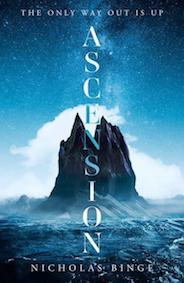
Ascension [Harper Orbit] by Nicholas Binge falls, I think, into the category of science-fiction or speculative fiction, but I am happy to be corrected on that score as the view of popular reading habits is somewhat restricted from my high castle.
Basically, a large mountain – bigger than Everest – has suddenly emerged from the floor of the South Pacific and an initial expedition to climb it has ended in death and disaster. A second expedition is sent, in conditions of great secrecy and encounters altitude sickness, hallucinations, apparent time slips, death and dismemberment and a legion of out-of-this-world four-eyed monsters. What is it all about? I’m still not sure, though the future of humanity seems to be at risk.
What initially attracted me to Ascension was the way it began, which reminded me of one of my favourite adventure thrillers, Lionel Davidson’s The Rose of Tibet, whilst the similarities did not last long and although I quickly realised that Ascension was above my pay-grade, I found it strangely addictive.
|
|
BOOKS OF THE MONTH
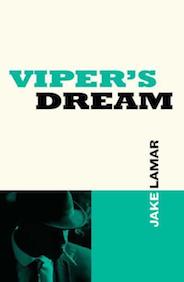
Any book which takes its title from a famous Django Reinhardt number gets my attention and when it’s as good as Jake Lamar’s Viper’s Dream [No Exit], it should get everybody’s. Clyde ‘The Viper’ Morton moves from rural Alabama to the hot spot that is Harlem in 1936 in the hope of making it as a jazz trumpeter. He doesn’t, but does establish himself as a major dealer in the growing marijuana market. Over the next twenty years the Viper becomes a powerful gangster, and a coldly calculating murderer as he protects his trade in ‘weed’ against the growing popularity of heroin among jazz musicians as swing music is supplanted by the bebop generation, which in turn is threatened by rock-and-roll. Several jazz legends appear in person - Miles, Dizzy, Thelonius et al and there is even a small cameo, when the Viper’s trade expands to Hollywood, of Robert Mitchum. Much of the strength of Viper’s Dream is how it deals with the evolving jazz scene, but it also scores on its depiction of Harlem and in the characters (mostly disreputable) and their conflicted loyalties and emotions. Hard-boiled, but also achingly tender, this is a tour-de-force of jazz noir – if that’s a thing; and if it isn’t it should be.
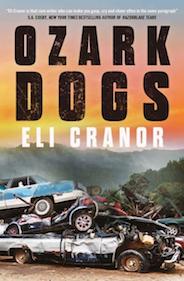
I first came across the term country noir about twenty-five years ago in connection with the novels of Daniel Woodrell, to describe hardboiled crime stories set in deepest, darkest, usually mountainous, rural America. The latest example of this sub-genre, and a pretty darned good one, is Ozark Dogs [Headline] by Eli Cranor, who lives in what he proudly declares to be ‘the heart of True Grit country’. It certainly seems that you need grit to live in the Ozarks with its ‘rust-coloured towns’, redundant nuclear plants and junkyards where the population is blighted by poverty, drug manufacturing, prostitution, the Ku Klux Klan, an abundance of weaponry, macho posturing and violent family feuds. The central Ozark dog in the story (who does not treat his actual dogs very well) is a grandfather desperately over-protecting his teenage granddaughter from multiple imagined threats which suddenly become very real when she is kidnapped to be trafficked to a Mexican drug cartel. Fortunately, the grandaddy is a Vietnam veteran ace sniper. Unfortunately, he shoots straightest only after a pint of bourbon.
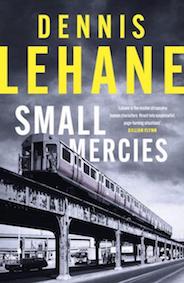
The city of Boston, or at least its dark underside, has long been a happy hunting ground for American crime writers and film makers. I used to think no-one did it better than the late George V. Higgins, but I have to say that the current king of that particular hill is indisputably Dennis Lehane. His new novel Small Mercies [Abacus] is a quite superb examination of the corruption and criminality protected, indeed encouraged, by the twisted loyalties and prejudices of the Irish community. Set in 1974, just as Boston’s schools are about to be desegregated and certain areas of the city are at boiling point, not just from the current heatwave. One night the teenage daughter of the formidable Mary Pat Fennessey does not come home. The same night, a young black man is killed on a subway station. Mary Pat, trying to find her missing daughter, comes up against the tribal omerta of the areas Irish mobsters and, with little trust in the judicial system, takes matters into her own hands. It’s a tough, brutal, heart-rending and very shocking picture of America’s underlying racism.
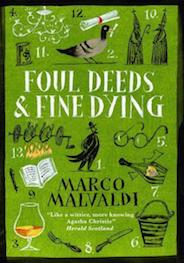
For a complete change of mood, Marco Malvaldi serves up a deliciously savoury concoction in Foul Deeds and Fine Dying [MacLehose Press]. Set in 1900 in a castle in Tuscany where secret talks about supplying the armies of both Italy and the Ottoman Empire are taking place, Malvaldi has great fun spoofing - but also utilising - many of the tropes of the Golen Age detective novel when a murder takes place in a locked room. (He also ‘breaks the fourth wall’ by suggesting to the reader that a clue would have been spotted had there been VAR and scoffing at the very thought that the butler could have done it.) On hand to help the police with their investigation is the famous Pellegrino Artusi, possibly the first celebrity chef, which is a good excuse to include several Tuscan recipes and top marks to the translator, for using (correctly) the word ‘wether’ for a castrated ram, the Italian, I think, being un castrato.
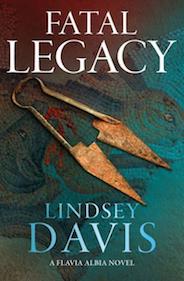
Nobody does late first century Rome better than Lindsey Davis, especially the bits the tourists do not visit, even the less-discriminating tourists of the first century. Set in the throbbing, often dangerous, Aventine area, Fatal Legacy [Hodder] sees debt-collector and investigator Flavia Alba (adopted daughter of Rome’s premier private eye Marcus Didius Falco) caught up in a case which begins with an unpaid bar bill - and a lot of bars have therefore to be investigated – and gradually entangles her in the fortunes of two families, proving the fact that slaves had been legally freed, finding eloping lovers and uncovering some deeply concealed secrets including a sexual assault ‘in the Greek way’. Everyone Flavia questions is economical with the veritas and her investigation involves rabbit-farming in Spain, cat-basket makers, garum salesmen, bakers who have developed a ‘digestive’ loaf, shady lawyers and, at the heart of a long-running legal dispute, an apricot orchard. All teeming Roman life is here with its smells, entrenched snobbery (especially when it comes to women and slaves) and superstitions described by a wise-cracking heroine. A feast, to be savoured with a cup, or two, of violet wine.
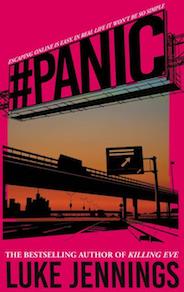
I am sure I am not the target audience for #Panic by Luke Jennings [John Murray] but I am sure there will be one once it can be read on a ‘device’ or when it inevitably, makes a television series. The plot revolves around a hit TV sci-fi fantasy show called City of Light, which has a consultant ‘chaos magician’ and psychic and naturally draws the wrath of the anti-woke international movement known as The Legion. It has four dedicated gender fluid fans who are internet chat room best friends forever, from England, Canada, Australia and Russia and when one of the female leads of their favourite show seems to be suffering from domestic abuse, they ride, somewhat implausibly, to the rescue during a City of Light fan convention in San Diego. The lead actress’ abusive husband is found murdered and so our fantastic four do the obvious thing, they help her run away and the plot becomes something of a road movie as the fugitives cross several southern states, a journey which includes jumping on freight trains, treks across deserts, meeting up with hippies living in decommissioned US Air Force bombers, joining a travelling circus, braving alligators in a swamp, and always pursued by the odious Legion and the occasional Russian gangster. How they survive being off social media for week is the biggest mystery.
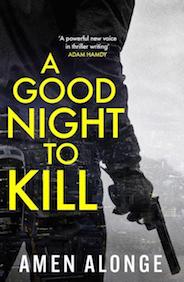
You don’t have to have read Amen Alonge’s stunning debut from last year, A Good Day To Die, to get the most out of its sequel A Good Night To Kill [Quercus] even though it continues the violent and (very) bloody careers of several of the protagonists – or at least those who survived. It is the every-day story of gangsters, both home-grown and Russian newcomers, defending or carving-up their drug-dealing turf in London, orchestrated by corrupt ex-policemen and even more corrupt politicians on the make. At the centre of the coming storm – and with so much weaponry available, a storm is inevitable – is the enigmatic ‘Pretty Boy’, the legendary survivor of previous gang wars currently living quietly in a small town well away from London. But we all know that’s not going to last, especially when the body count starts to rise. Turbo-charged hardboiled crime fiction which takes few, if any, prisoners.
SITUATION (POSSIBLY) VACANT
This month’s column was deliberately not published on April 1st because then no-one would have believed the advance notice that I am considering retirement from this column (just this column, not the world) in August, which should see Getting Away With Murder #200.
To me, that seems a reasonable number on which to call it a day. I am not getting any younger and I have an awful lot of books stacked up which I want to, rather than feel I have to, read. I have been reviewing crime fiction for 34 years now, making some good friends and discovering many fine writers along the way, but surely due for some time off for good behaviour...
Pip! Pip!
The Ripster
|